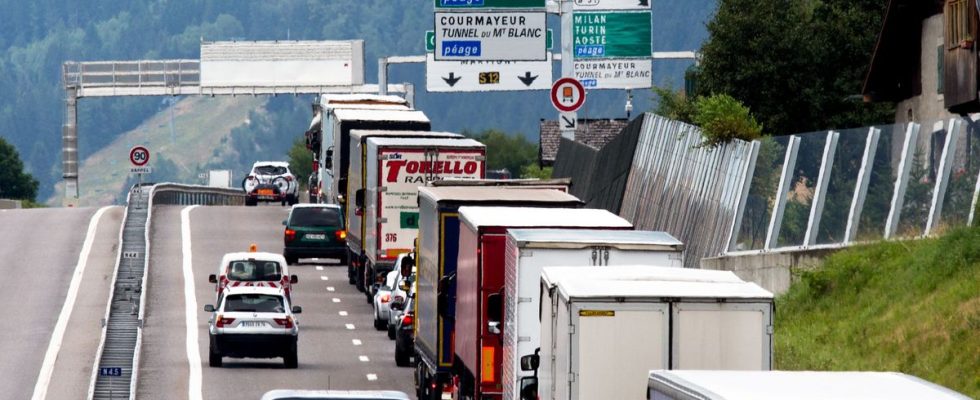The Mont-Blanc tunnel, a major road between France and Italy, will be closed for more than three consecutive months, from September 4 to December 18, 2023, then as much again in 2024, for heavy renovation work which will continue for years. following.
Built sixty years ago, used daily by thousands of vehicles, this two-way structure, 11.6 km long, is at a stage where one-off repairs are no longer enough. “We made the choice to carry out more important, more substantial work to give a second life to this tunnel”, explains Grégory Schwarshaupt, deputy director of the French concession company Autoroutes et Tunnel du Mont-Blanc (ATMB). It is about its “sustainability over the long term”, he adds.
A “first” for twenty years
The long periods of closure will be a “first” for the tunnel since its reopening in 2002 after the fire which ravaged it on March 24, 1999, costing the lives of 39 people. The operators, who are simultaneously carrying out renovation work on part of the slab, have so far always managed to stick to night closures, apart from a three-week period in the fall of 2022.
At the time, leaks in the Italian press on potential shutdown scenarios had caused serious concern in Italian business circles, some fearing that they would “bring the country’s economy to its knees”. In France, elected officials are worried about a risk of increased pollution in the Maurienne valley, where traffic could be transferred via the Fréjus tunnel, another important Franco-Italian axis.
1,700 trucks per day
Tight and poorly ventilated, the Arve valley, which leads to the Mont-Blanc tunnel, regularly experiences episodes of air pollution, linked among other things to road traffic and its nitrogen dioxide emissions. The Mont-Blanc tunnel sees around 1,700 heavy goods vehicles pass through the year, while light vehicle traffic averages 3,600 cars/day, with peaks of more than 6,000 in August and troughs in autumn.
The first two construction phases, described as “experimental”, should allow the repair of the vault on four sections totaling 1,200 meters, or approximately 10% of the total length, and to develop the most efficient schedule possible. for the remaining 90%, which will also have to be renovated in the following years.
Closing on September 4
The closure will take effect on September 4, 2023, the day after the end of the Ultra-trail du Mont-Blanc (UTMB) events, a great tourist and sporting mass on both sides of the border. End scheduled for December 18, shortly before the Christmas holidays. “We don’t have much leeway” between these two meetings, admits the deputy director.
The first test site will allow the renovation of 600 meters of vault in two places. If its results are positive, an additional 600 meters will be renovated in 2024. These first two phases have been budgeted at 50 million euros, supported equally by the French (ATMB) and Italian (SITMB) concession companies.
For the rest, “everything remains open”, underlines Grégory Schwarshaupt, who says “understand the expectation” of regional players, particularly in the tourism sector, and transporters. “The sooner we can communicate, explain how the rest of this project will unfold, the better it is for everyone. It won’t be before the end of 2024,” he explains.
Some 92% of the goods circulating between France and Italy pass by road, according to the Alpine Territories Agency, i.e. 3 million heavy goods vehicles and 43 million tonnes (Mt) on all the roads in the Alps.
According to Grégory Schwarshaupt, the data collected during the three weeks of closure in the fall of 2022 saw a “90%” postponement of heavy goods vehicle traffic to Fréjus. As for light vehicles, 30% went to Fréjus, 40% to the Grand Saint-Bernard tunnel and 20 to 25% had “disappeared”.

